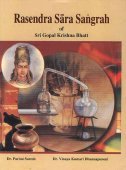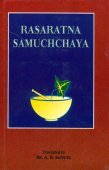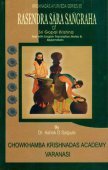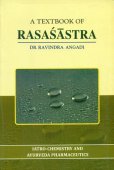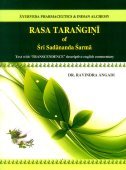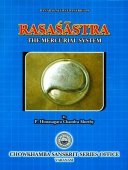Uparasa, Upa-rasa: 11 definitions
Introduction:
Uparasa means something in Hinduism, Sanskrit. If you want to know the exact meaning, history, etymology or English translation of this term then check out the descriptions on this page. Add your comment or reference to a book if you want to contribute to this summary article.
In Hinduism
Ayurveda (science of life)
Rasashastra (Alchemy and Herbo-Mineral preparations)
Source: Wisdom Library: Rasa-śāstra1) Mahārasa and Uparasa, (translated as ‘mercuries’) are two groups of alchemical mineral agents, according to the Rasaśāstroddhṛti (Sanskrit alchemical work). These two groups of minerals (or rocks that contain minerals) are involved in ‘purifying’ and ‘killing’ metals, as well as eliminating the poisonous components of mercury. Therefore, they are also called the ‘devourer elements’.
According to the Rasasiddhiśāstra, the seven uparasa are:
- kashika (kāśīsa) or ‘iron-sulphate’,
- yellow and white orpiment,
- realgar,
- sulphur,
- ‘acid rock’ (skyur po’i rdo),
- ‘petals’ (’dab ma),
- and ‘hematite’ (sbal rgyab rdo).
2) Uparasa (महारस):—The name of a group of eight minerals, according to the Rasaprakāśasudhākara: a 13th century Sanskrit book on Indian alchemy, or, Rasaśāstra. They are considered inferior in relation to their superior counterparts of the Mahārasa group, also consisting of eight minerals.
These are the names of the eight minerals (Sanskrit name first, english name in brackets):
- Tālaka/Haritāla (‘orpiment’),
- Saurāṣṭrī/Tubarī/Sphaṭikā/Kāṅkṣī (‘alum’),
- Gandhaka (‘sulphur’),
- Kaṅkuṣṭha (‘rhubarb extract’),
- Kunaṭi/Manaḥśilā (‘realger’),
- Añjana/Sauvīra/Nīlāñjana (‘lead sulphide’),
- Gairika (‘hematite’/‘red ochre’)
- and Khecara/Kāsīsa (‘green vitriol’/‘ferrous sulphate’).
As per Rasaprakāśa Sudhākara following eight drugs are included in this (uparasa) group, viz-
- Tālaka/haritāla (orpiment),
- tubari/sphaṭikā (alum),
- gandhaka (sulphur),
- kaṅkuṣṭha (rhubarb extract),
- kunaṭi/manaḥśilā (realger),
- sauvīra/nīlȧn‚
- jana (lead sulphide),
- gairika (hematite-red) ochre
- and khecara/kāsīsa (green vitriol/ ferrous sulphate)
Uparasa (उपरस) refers to “eight metals which are considered slightly inferior to mahārasas in processing mercury”, and mentioned in the Rasaratnasamuccaya: a 13th century C.E. alchemical treatise, authored by Vāgbhaṭa, is a useful compilation related to preparation and properties of drugs of mineral and metallic origin.

Āyurveda (आयुर्वेद, ayurveda) is a branch of Indian science dealing with medicine, herbalism, taxology, anatomy, surgery, alchemy and related topics. Traditional practice of Āyurveda in ancient India dates back to at least the first millenium BC. Literature is commonly written in Sanskrit using various poetic metres.
Vaishnavism (Vaishava dharma)
Source: ISKCON Press: GlossaryUparasa (उपरस).—The first kind of rasābhāsa, occurring when one tastes one kind of mellow and something extra is imposed.

Vaishnava (वैष्णव, vaiṣṇava) or vaishnavism (vaiṣṇavism) represents a tradition of Hinduism worshipping Vishnu as the supreme Lord. Similar to the Shaktism and Shaivism traditions, Vaishnavism also developed as an individual movement, famous for its exposition of the dashavatara (‘ten avatars of Vishnu’).
Languages of India and abroad
Sanskrit dictionary
Source: DDSA: The practical Sanskrit-English dictionaryUparasa (उपरस).—
1) A secondary mineral, (red chalk, bitumen, mākṣika, śilājita &c).
2) A secondary passion or feeling.
3) A subordinate flavour.
Derivable forms: uparasaḥ (उपरसः).
Source: Cologne Digital Sanskrit Dictionaries: Shabda-Sagara Sanskrit-English DictionaryUparasa (उपरस).—m.
(-saḥ) 1. A secondary mineral, as red chalk, bitumen, &c. 2. A secondary passion. 3. A subordinate flavour. E. upa minor, rasa flavour, &c.
Source: Cologne Digital Sanskrit Dictionaries: Monier-Williams Sanskrit-English Dictionary1) Uparasa (उपरस):—[=upa-rasa] m. a secondary mineral (as red chalk, bitumen etc.), [Bhāvaprakāśa]
2) [v.s. ...] a secondary feeling or passion, [cf. Lexicographers, esp. such as amarasiṃha, halāyudha, hemacandra, etc.]
3) [v.s. ...] a secondary flavour, [cf. Lexicographers, esp. such as amarasiṃha, halāyudha, hemacandra, etc.]
Source: Cologne Digital Sanskrit Dictionaries: Yates Sanskrit-English DictionaryUparasa (उपरस):—[upa-rasa] (saḥ) 1. m. Secondary mineral, flavour or passion.
Source: DDSA: Paia-sadda-mahannavo; a comprehensive Prakrit Hindi dictionary (S)Uparasa (उपरस) in the Sanskrit language is related to the Prakrit word: Orasa.
[Sanskrit to German]
Sanskrit, also spelled संस्कृतम् (saṃskṛtam), is an ancient language of India commonly seen as the grandmother of the Indo-European language family (even English!). Closely allied with Prakrit and Pali, Sanskrit is more exhaustive in both grammar and terms and has the most extensive collection of literature in the world, greatly surpassing its sister-languages Greek and Latin.
See also (Relevant definitions)
Partial matches: Rasa, Upa, Raca.
Starts with: Uparacan, Uparasala, Uparashanadama.
Ends with: Suparasa.
Full-text (+779): Orasa, Uparatam, Kankshin, Khecara, Sphatika, Haritala, Tubari, Pushpanjana, Khandika, Rasanjana, Kanavira, Shukapiccha, Pushpakasisa, Nilanjana, Srotonjana, Balukakasisa, Raktagandhaka, Sadharana, Shvetagandhaka, Sauviranjana.
Relevant text
Search found 6 books and stories containing Uparasa, Upa-rasa; (plurals include: Uparasas, rasas). You can also click to the full overview containing English textual excerpts. Below are direct links for the most relevant articles:
Rasa Jala Nidhi, vol 2: Minerals (uparasa) (by Bhudeb Mookerjee)
Introduction (classes of uparasa)
Part 2 - Purification of sadharana uparasas (i.e. from kampilla to bhunaga) < [Chapter XVI - Uparasa (17): Kampilla]
Part 2 - Purification of Kankustha (an ore containing tin) < [Chapter XV - Uparasa (16): Kankustha (an ore containing tin)]
Bhakti-rasamrta-sindhu (by Śrīla Rūpa Gosvāmī)
Verse 4.9.9 < [Part 9 - Incomplete Expression of Mellows (rasābhāsa)]
Verse 4.9.17 < [Part 9 - Incomplete Expression of Mellows (rasābhāsa)]
Verse 4.9.32 < [Part 9 - Incomplete Expression of Mellows (rasābhāsa)]
Rasa Jala Nidhi, vol 1: Initiation, Mercury and Laboratory (by Bhudeb Mookerjee)
Part 3 - Drawing of a hexagonal lotus diagram < [Chapter II - Initiation of Disciple]
Rasa Jala Nidhi, vol 4: Iatrochemistry (by Bhudeb Mookerjee)
Part 19 - Directions for preparing a medicine with ingredients more than one < [Chapter I - General health prescriptions]
Atharvaveda and Charaka Samhita (by Laxmi Maji)
Rasendrasāra Saṅgraha (Āyurveda book) < [Chapter 1 - Introduction]
Rasa Jala Nidhi, vol 3: Metals, Gems and other substances (by Bhudeb Mookerjee)
Related products
(+2 more products available)
